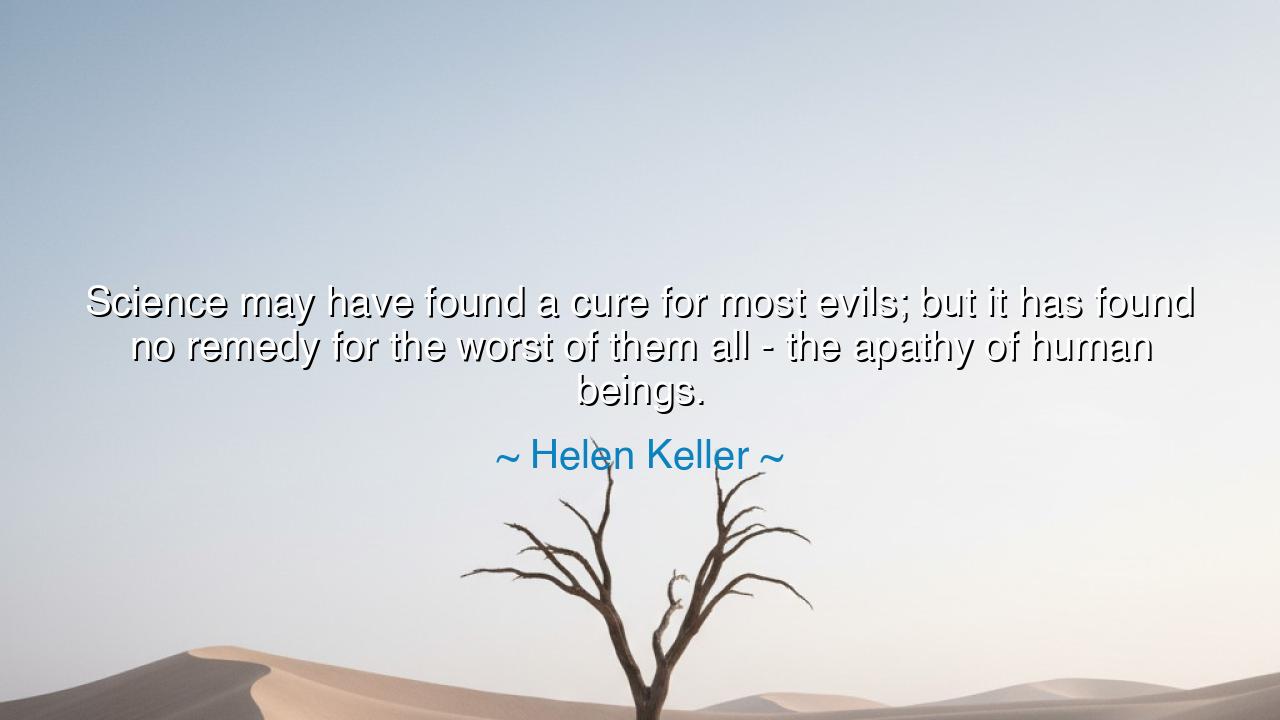
Science may have found a cure for most evils; but it has found no
Science may have found a cure for most evils; but it has found no remedy for the worst of them all - the apathy of human beings.






"Science may have found a cure for most evils; but it has found no remedy for the worst of them all—the apathy of human beings." These words, spoken by the indomitable Helen Keller, ring with a truth that is as deep as it is unsettling. In the grandeur of human achievement, in the triumph of science, technology, and progress, there is a stark, undeniable void—the apathy that dwells in the hearts of men and women, a silent poison that undermines the very efforts to better the world. Science, for all its wonders, has failed to address this insidious force, which leaves us indifferent to the suffering of others, blind to the injustices around us, and unmoved by the cries of the world in need.
Let us recall the wisdom of the ancient philosophers, who spoke often of the human soul and its capacity for virtue. Socrates, in his great wisdom, believed that the pursuit of knowledge was the highest calling, but he also knew that knowledge without action was a hollow thing. Plato too, in his dialogues, spoke of the need for the philosopher to not only understand the world but to act upon that understanding for the good of society. It was not enough to know the truth; one had to live it, to fight for justice, to engage with the suffering of others. And yet, despite the teachings of the great sages, there remains a blindness in the hearts of many—a failure to see the suffering of others, a failure to act, and an indifference to the plight of those who are less fortunate.
Helen Keller, who herself overcame the most unimaginable odds to speak truth to the world, understood this reality more intimately than most. Born both deaf and blind, she could have succumbed to apathy, as many would have expected. She could have lived in isolation, indifferent to the world outside her silent darkness. Yet, instead, she chose to engage with the world, to see it not through the lens of her limitations, but through the lens of compassion, action, and love. She became a tireless advocate for social justice, women’s rights, and the rights of the disabled, reminding us that the most powerful remedy for suffering is not the discovery of a new drug or treatment, but the willingness to care, to act, and to fight for the good of all people.
In the modern world, we have witnessed the wonders of science that have eradicated disease, extended life, and brought untold comfort to millions. The advent of vaccines and antibiotics has healed the sick, while technological advancements have revolutionized the way we live, connect, and understand the world. Yet, as Keller so poignantly points out, the greatest affliction remains unchecked—the apathy that still grips the hearts of many, making us indifferent to the suffering of others. Science may have cured many physical ailments, but it has not yet found a cure for the disease of indifference that allows hunger, poverty, war, and injustice to persist in our world.
Consider the example of Mahatma Gandhi, who stood against the might of the British Empire not with weapons, but with compassion, non-violence, and an unwavering belief in the human spirit. His call for freedom and equality was not just a fight against colonial rule, but a fight against the apathy that allowed injustice to continue unchecked. Gandhi’s success lay not in his ability to wield power, but in his ability to stir the hearts of ordinary men and women, to awaken them from their indifference, and to show them that their voices and actions could change the world. This, then, is the great lesson of Keller’s words: to confront apathy is to confront the greatest evil, and the fight against indifference is the fight that must be fought with all the strength of the human heart.
And so, the lesson we must carry from Keller’s wisdom is this: science may offer us cures for the body, but the cure for the soul lies in our ability to care—to see the suffering around us, to listen to the cries of the oppressed, and to act with compassion. In our daily lives, let us not fall prey to indifference. Let us not be content with simply living in comfort, while others are left to suffer. The path forward is not through technology alone, but through the awakened hearts of those who are willing to act, to care, and to fight for a world where no one is left behind. This is the true medicine for the ills of humanity: the active, compassionate, and relentless pursuit of justice.
In your own life, reflect upon your response to the suffering of others. Are you moved by the pain of those who are in need? Do you act, or do you remain indifferent? Let Keller’s words serve as a reminder that the cure for apathy is within our grasp. It is in our willingness to engage, to care, and to fight for the good of all. Let us commit ourselves to the work of healing—not just with science, but with the human spirit. For in doing so, we will transcend the greatest evil of all: the indifference that allows suffering to persist unchecked. Let this be our task, our calling, and our legacy.






AAdministratorAdministrator
Welcome, honored guests. Please leave a comment, we will respond soon